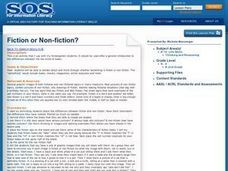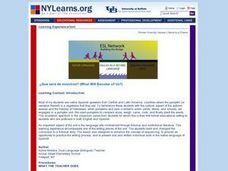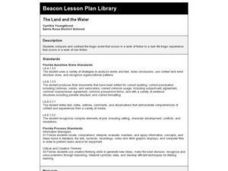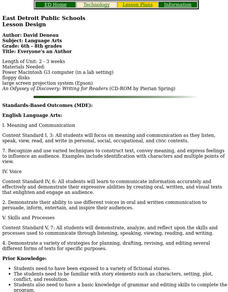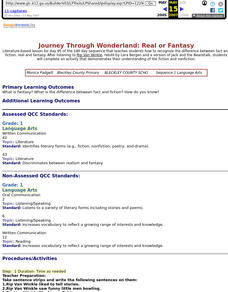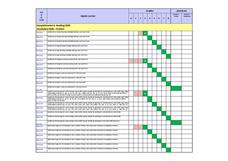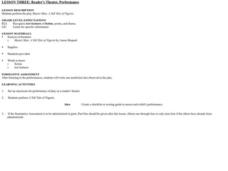Curated OER
Fiction or Non-fiction
Third graders view three texts, A DAY IN THE LIFE OF A FOOTBALLER, THE HUMAN BODY, AND WHICH IS WHICH? with the titles covered. They discuss whether the books are non-fiction or fiction and try to come up with suitable titles for the books.
Curated OER
The Art of Creating a Character Using a Press Conference
Learners brainstorm and create list of traits of memorable fictional characters they have read about, write down ten characteristics about new character that they are going to create, discuss ways to make characters come alive, and write...
Curated OER
?Que ser de nosotros? (What Will Become of Us?)
Students discuss uses of a pumpkin. They fill out graphic organizers. Students listen as the teacher reads a story, and participate by repeating sounds the objects make as the story progresses. One student narrates the story while others...
Curated OER
Fiction Elements in Hatchet
Students read or listen to Hatchet by Gary Paulsen, identify elements of fiction, develop writing, thinking, and organizing skills, and create PowerPoint slides based on the story.
Curated OER
An Anecdote is Worth a Thousand Pictures
Students identify anecdotes in speeches and the purposes that politicians use the anecdotes for. They create personal anecdotes for the class to hear, and students decide if the anecdote is real or fabricated.
Curated OER
The Land and the Water
Third graders read "The Land and the Water," a fictional short story and an article about John F. Kennedy, Jr. and compare and contrast fictional tragedy to a non-fiction tragedy. They fill out a Venn diagram and write an essay using...
Curated OER
Exploring Space Fiction
Students visit web sites with information on space fiction and collect information for their stories.
Curated OER
Everyone's an Author
Students examine variety of written pieces of quality fiction, discuss what different story elements are present and how those elements make stories as effective as they are, and create a class story.
Curated OER
Kid Lit Crit
Students explore different types of student literature; they then write their own fiction pieces, in either fantasy/adventure or memoir/realism style.
Curated OER
Journey Through Wonderland: Real or Fantasy
First graders recognize the difference between fact and fiction, real and fantasy. After listening to Rip Van Winkle, retold by Lara Bergen and a version of Jack and the Beanstalk, 1st graders demonstrates their understanding of fiction...
Curated OER
Summarizing Key Information
Students summarize information. In this language arts lesson, students summarize information from a fictional text. Students read a folktale and summarize the story.
Pennsylvania Department of Education
Stories? Information? What's the Difference?
Students listen to a power point presentation to distinguish between fiction and nonfiction text. In this what's the difference lesson, students identify fact from opinion within a text. Students listen critically and respond to text.
Curated OER
Story Starters for Science Fiction Story
Young scholars write creative science fiction stories. In this science literacy activity, students develop their stories from a given set of starters.
Curated OER
Reader's Theater
Students perform a reader's theater. In this analyzing text instructional activity students perform Master Man: A Tall Tale of Nigeria, a play by Aaron Shepard. The students are assessed on their performance.
Curated OER
Reader's Theater, Rehearsal
Pupils rehearse a play. In this Reader's Theater lesson, students practice reading a play, Master Man: A Tall Tale of Nigeria by Aaron Shepard. Pupils discuss fluency, intonation, and volume when presenting.
Curated OER
Hoppy's Busy Day
In this reading comprehension worksheet, students read an Easter story titled Hoppy's Busy Day.Students then answer 4 reading comprehension questions.
Curated OER
School-Home Links: Fiction
In this fiction book worksheet, students read a book that is about make-believe people or animals and their lives. Students then write three things about the story that are make-believe. Parents or guardians must sign the worksheet.
Curated OER
School-Home Links: Fiction, Encyclopedias, Atlases
In this classifying information and parent communication form worksheet, students write where they would look to find the information listed. Students options are fiction, encyclopedia, or atlas. Students must also get their parent or...
Curated OER
20,000 Leagues Under The Sea
In this language arts activity, students locate 29 words from the book Twenty Thousand Leagues Under the Sea . Words include main characters from the book as well as words related to major events in the novel.
Curated OER
Reading For Pleasure
Students develop a variety of reading skills that diagnosis has revealed as lacking. They use this activity to promote pleasure in reading, to emergent readers to travel further into the world of books and begin to comprehend what rich...
Curated OER
Someone Like Me
Students investigate what sort of person the author is. They listen as the teacher use her notes to introduce Tom Holt briefly. Students are asked if anyone has read any of his books. They work in pairs to find more about Tom Holt as a...
Curated OER
Fiction and Nonfiction
Fourth graders differentiate between fiction and nonfiction using the books "Sarah Plain and Tall" and "A Day in the Prairie." They develop a list of information that they learn from the text, and create an information web. Students...
Curated OER
News real?
Students distinguish and evaluate information from various sources and determine whether the information found is fiction or facts. They also view television shows, radio stations and newspaper articles Internet sites are also visited by...
Curated OER
Anthony Burns
Young scholars investigate the reading of the novel about Anthony Burns. They create a KWL chart to gather and organize information. The information that is provided is used to create a presentation. Students also use journals to keep...


